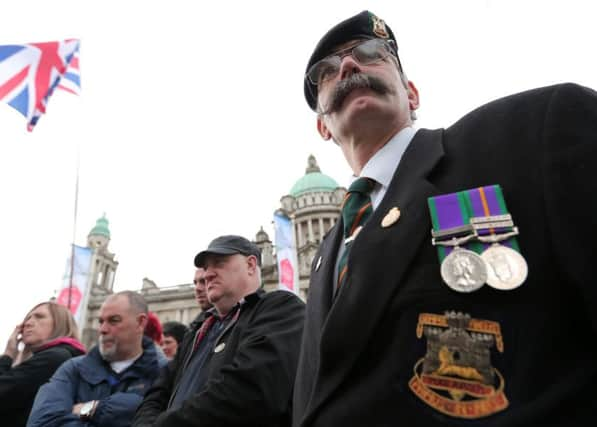Army veterans urged to put Ballymurphy inquest letters '˜in the bin'


Former soldiers from both the Parachute Regiment and the Queen’s Regiment, who were based in west Belfast in August 1971, have been contacted by a London-based legal firm to assist with the “fact finding exercise” around the deaths of 10 civilians.
A letter sent by Fieldfisher – acting on behalf of the Coroners Service for NI (CSNI) – informs the veterans that the inquest process “is not a method of apportioning guilt,” and that no one is obliged to answer questions “if they may tend to implicate you in a criminal offence”.
Advertisement
Hide AdAdvertisement
Hide AdMrs Justice Siobhan Keegan has been appointed to conduct the inquest regarding the deaths in the Ballymurphy area between August 9 and August 11. The full hearing will commence on September 10.
Alan Barry of Justice for Northern Ireland Veterans (JFNIV) said his group is urging former soldiers to “put the letters in the bin”.
JFNIV is campaigning for the introduction of a ‘statute of limitations’ that would prevent the prosecution of veterans involved in Troubles-era deaths.
In the absence of such an arrangement, Mr Barry said it was unreasonable to expect former soldiers to come forward voluntarily with “nothing to gain but everything to lose”.
“This is a fishing exercise,” he said.
Advertisement
Hide AdAdvertisement
Hide Ad“The coroner can make a recommendation [to the DPP] at the end of this inquiry, and from that there could be criminal investigations.”
The letter to veterans states: “At the conclusion of the inquest the facts found may, if there are grounds to do so, be referred to the director of public prosecutions for Northern Ireland. Any matters relating to a criminal investigation is a matter for the Police Service of Northern Ireland and the director of public prosecutions. The coroner is only concerned with the progress of her investigation to answer the statutory questions about the 10 people who died.”
Mr Barry said it was “always sad when there are deaths,” but stressed that the Ballymurphy deaths occurred during one of the most violent periods of the Troubles as the government introduced internment without trial – detaining 342 mainly IRA suspects across Northern Ireland.
The 10 people killed were: Francis Quinn; Father Hugh Mullan; Noel Phillips; Joan Connolly; Daniel Teggart; Joseph Murphy; Edward Doherty; John Laverty; Joseph Corr; and John James McKerr.
Advertisement
Hide AdAdvertisement
Hide AdA spokeswoman for the CSNI confirmed that a first batch of 69 letters has drafted, with 48 already delivered, although further letters are expected to be sent as other veterans are identified. The letter assures the veterans they can access any previous written statements they have made as the process is not “intended to be a memory test”.
It adds: “Any witness asked to assist the coroner has a right to what is known as privilege against self-incrimination.”
The MoD is offering free legal advice to any veterans assisting the inquest.
Mr Barry added: “What really annoys the veterans is that the British government is paying for this. The very state that sent us to Northern Ireland is now paying to investigate us. It is treacherous.”
Advertisement
Hide AdAdvertisement
Hide AdA spokesperson for the MoD said: “The welfare of our personnel and veterans is of the utmost importance and we will give legal and pastoral support to any veteran who requires it. It is for the Coroners Service for Northern Ireland to conduct these investigations and we remain fully committed to supporting this process.”
When the decision to hold an inquest was announced last May, John Teggart, whose father Daniel was killed in Ballymurphy, said it was “a great day for truth and justice”.